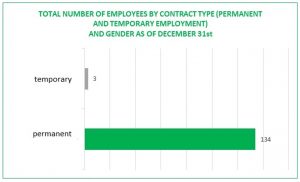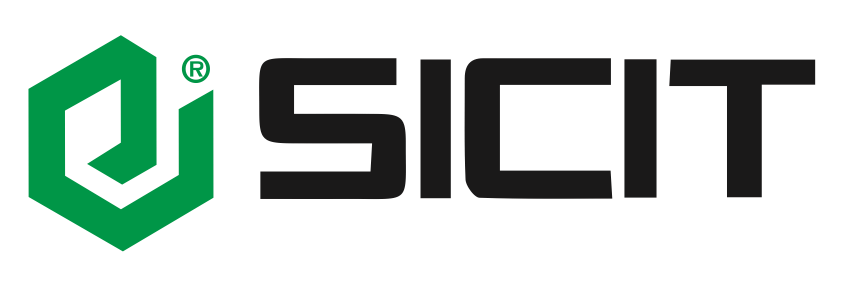SICIT Group employees
SICIT safeguards and promotes the value of its human resources, considered fundamental for the pursuit of corporate targets, committing itself to avoid discrimination of any kind and ensuring equal opportunities of professional growth, offering working conditions that are respectful of individual dignity and safe and healthy working environments. As of 31 December 2019, there are 137 employees of SICIT.
SICIT is committed to enhance the professional contribution of each of its employees and to build lasting relationships based on the values of loyalty, mutual trust and collaboration. Almost all employees are employed with permanent contracts (98% of total Group employees).

Blue-collar workers are the most represented professional category (52%), followed by white-collar workers (36%), middle managers (9%) and executives (3%). SICIT’s workforce composition is predominantly in the older age group, between 30 and 50 years of age (50%), while those under 30 represent 19% of the workforce and those over 50 the 31%.
Development and competence integrity
SICIT is committed to developing the skills and competences of its employees, pursuing a policy based on equal opportunities and merits, considering professionalism a key condition and a guarantee for the entire community.
Research, selection, recruitment and career development respond to objective assessments of job quality, without any discrimination.
With the aim of developing the skills of each employee, specific training activities are carried out on the subjects of worker safety, development of specific skills for operational personnel, English language courses for all employees covering non-operational roles, English, French, Spanish and Portuguese language courses for the commercial figure and specific refresher courses for laboratory technicians regarding the use and maintenance of the plants.
In 2019 were provided more than 1,660 hours of training, of which 790 were mandatory and 872 non- mandatory. Executives, with 39.8 hours of training per capita, are the professional category that received the highest number of training hours, followed by managers who received 18.5 hours of training per capita.
SICIT is constantly striving to attract, motivate and retain key resources. For this purpose, an incentive compensation plan (“2020-2022 Incentive Plan”) was approved by the Ordinary Shareholders’ Meeting of SICIT in 2020, on the proposal of the Board of Directors and with the favourable opinion of the Remuneration and Appointments Committee in office, which provides for the payment of a bonus to beneficiaries linked to SICIT’s corporate performance objectives, individual objectives and performance on the Stock Exchange.
In addition, a loyalty bonus in the amount of one month’s salary was disbursed in June and a performance-based production bonus that, if not fully disbursed, is set aside by the Company and used to support workers in emergency situations, such as payment of funeral fees or medical examinations, have been introduced.
In order to create favourable working conditions and support work-life balance, in order to cope with the lock-down period caused by the Covid-19 health emergency, total or partial smart working has been granted to categories not involved in production departments.
The approach adopted by SICIT in its industrial relations has always been based on mutual respect for each others roles and positions, in the constant search for a constructive dialogue. To this regard, it should be noted that no internal strikes have ever taken place and that the corporate decisions taken by SICIT have never been the subject of dispute by employees. Depending on the countries in which SICIT is present and the different regulations in force, employment relationships are governed by national or company collective agreements or by current legislation. Almost all (98%) of SICIT employees are covered by Collective Bargaining Agreements. The remaining part, i.e. the three employees who work at the headquarters of SICIT Commercial Consulting Shanghai Ltd. and SICIT USA Inc., are hired under corporate or individual contracts having as reference the local market rules and practices.
Workplace health and safety
SICIT primary values are policies for safety and protection of the working environment, with the aim of reducing and, in the future, eliminating the number of accidents in the workplace, with technological investments, new policies and training for workers.
Starting in 2013, the company has adopted a Health and Safety management system for workers in the workplace, in accordance with the OHSAS 18001 standard.
SICIT adopts a preventive approach by actively involving all stakeholders and a scrupulous assessment of health and safety risks. To this end, a Risk Assessment Document (DVR) has been prepared for both production plants. The document identifies the risks by departments and work activities (tasks/stations) as well as the related prevention and protection measures adopted. Due to the plant and structural changes that have affected the sites, the DVR update and assessments of some specific risks have been scheduled.
SICIT has set up a specific body to ensure the correct and adequate performance of activities aimed at eliminating or minimizing risks, to guarantee the correct flow of information between employer and worker on workplace risks.
During 2020, in the context of the due diligence on environmental, health and safety aspects of the Arzignano and Chiampo production plants, in preparation for the transition to the MTA market, an audit was carried out to verify the application of the mandatory requirements in terms of worker safety and management of environmental aspects. The audit included a visit to the plant, review of relevant documentation and an interview with plant representatives.
An external consultant covers the role of prevention service and protection (RSPP). SICIT has appointed a competent physician who, during 2019, performed 115 medical examinations and found 43 suitabilities and 70 suitabilities with prescriptions. In addition, 2 medical examinations for retirement at the end of the employment relationship were carried out. The competent doctor has also the task to carry out the Drug Test on operators for the forklift truck, the mechanical shovel, the mobile elevating work platform (AWP), the spider. Workers also elected their Safety Representatives.
Annually, a periodic safety meeting is held for both production plants, during which health and safety issues are discussed in accordance with Article 35 of Legislative Decree 81/2008. In 2019, a number of interventions aimed at improving worker safety at the two SICIT plants were completed, namely the refurbishment and implementation of the signage and labelling of the plants and pipes, and the analysis of the specific risk of legionnaires’ disease.
It should be noted that a near-missing process of reporting and management of missed accidents and dangers is in place, which makes it possible to promptly identify and solve problems that may expose workers to health and safety risks, improving safety levels in the workplace over time.
Employee training on Health and Safety issues is managed through a specific software through which the training hours provided and any need to update the training according to the deadlines by regulations in force, are monitored. SICIT workers have attended the mandatory training sessions on Health and Safety and those related to the use of equipment (e.g. forklifts and liftable movable work platforms – AWP) under the State-Regions Agreement of 22 February 2012. Training sessions on work at height and work in confined spaces are also carried out. An adequate number of workers have been designated and trained to implement fire prevention and firefighting measures, as well as first aid, to ensure sufficient coverage on all shifts. The last training session was carried out during 2020.
For the benefit of employees, SICIT has purchased blood and urine testing equipment. Employees who have particular pathologies can benefit from a series of analytical controls directly in the company infirmary.
Working relationships with third parties not directly dependent on SICIT are regulated by Article 26 of Legislative Decree 81/08 on obligations related to contracts for tenders, of works or supply contracts.
During 2019, there were no cases of work-related illness, while a total of three recordable work-related injuries* were recorded. Considering the three accidents that occurred in 2019, the rate of recordable work-related injuries** registered by the Group was 12.9.
In order to tackle the rise in spreading of the recent Covid-19 pandemic, during 2020 SICIT implemented all the policies aimed at containing the inevitable negative effects of the pandemic, reducing as much as possible internal movement within the sites and limiting access to common areas. SICIT immediately applied the strict rules aimed at containing the spread of the pandemic, such as social distancing, the use of personal protective equipment such as masks and gloves for both employees and external workers, plexiglass separators between desks, constant sanitization of the workplace and smart working.
Community relations
Over the years, the group has built up a close relationship with the areas where it operates. It fosters a spirit of shared solidarity and support within the communities it engages with on a daily basis and contributes to their social, economic and environmental development. SICIT promotes social-welfare type projects and the enhancement of the local areas’ cultural heritage.
In order to follow this commitment, SICIT makes donations to non-profit organizations, foundations and charity projects. During 2019, the group earmarked over €127 thousand for community projects.
SICIT actively collaborates with the universities of Udine, Padua, Verona and Milan. In addition, it maintains relations with the research centre in Turin and a new collaboration with the University of Pavia is underway.
SICIT Group is doing its part to help the Italian health system and territories to deal with the Coronavirus emergency. In 2020, the Board of Directors of the Company approved two donations in the amount of about 700,000 euros: the first in favour of a hospital in Vicenza, which will be identified among the ongoing projects, for the strengthening of intensive care units; the second in favour of the new Fiera Milano Hospital.
* A fracture of the metatarsus, a fracture of the phalanx and a second-degree burn.
** The injury rate has been calculated as the ratio between the total number of injuries and the total hours worked, using a multiplication factor of 1,000,000. The data includes the commuting incidents only where the transport has been organized by the organisation. It should be noted that the injury rate recorded by the Group relates to the companies Sicit Group S.p.A. and Sicit Chemitech S.p.A., as the figure for total hours worked does not include the hours worked by employees of the foreign companies due to the unavailability of the data. Please note that no accidents occurred at the foreign subsidiaries SICIT Commercial Consulting Shanghai Ltd. and Sicit USA Inc. in 2019. SICIT is committed to extend the scope of this data to the employees of the foreign companies as of the next reporting year.
